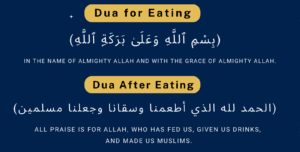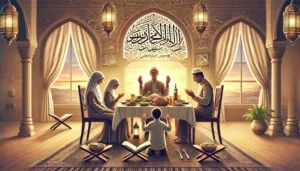In Muslim tradition, eating represents an act of worship, as it is performed with gratitude and mindfulness of the present moment. After eating, people should recite proper dual expressions that show gratitude to Allah and thus bestow blessings upon their food. According to Islamic traditions and traditional mealtime protocols, the article analyzes the importance of dua during eating and the appropriate supplications to use after eating.
The Importance of Eating Duas in Islam
Everything in Islam focuses on the remembrance of Allah, even during the simple act of eating. Eating dua must be stated before starting a meal to invoke blessings and after eating dua to express gratitude towards Allah for the provided sustenance. During eating, Muslims need to remember Allah as the Prophet Muhammad (peace be upon him) instructed to avoid Satan from sharing the meal.
1. Dua Before Eating
Before eating meals, one is supposed to recite a prayer mentioning Allah’s name for blessings and protection. Islam also enjoined that meals should begin with a segment of recitation of Alhamdulillah.
Dua Before Eating:
Bismillah wa ‘ala barakatillah
(بِسْمِ ٱللَّهِ وَعَلَىٰ بَرَكَةِ ٱللَّهِ)In the name of Almighty Allah and with the grace of Almighty Allah.
This straightforward dua asks for Allah’s blessings on the food and also helps one take the food with the same blessing.
3. Dua After Eating Food
Muslims who complete their meals are expected to recite a dua that expresses gratitude for the food they have received. The dua Muslims should most often recite after finishing their food consists of:
Dua After Eating:
Alhamdulillah illadhi at‘amana wa saqana wa ja’alana muslimin
(الحمد لله الذي أطعمنا وسقانا وجعلنا مسلمين)
All praise is for Allah, Who has fed us, given us drinks, and made us Muslims.
This dua is also used to express gratitude to the host for the food and drink, and to accept the gift of Islam. It also sets the tempo for a prayerful hymn as a reminder to be grateful to Allah for the provisions He has provided to humanity.
Another powerful after-eating dua is:
اَلْحَمْدُ لِلَّهِ الَّذِي أَطْعَمَنِي هَذَا وَرَزَقَنِيهِ مِنْ غَيْرِ حَوْلٍ مِنِّي وَلَا قُوَّةٍ
(Alhamdu lillāhi-lladhī aṭʿamanī hādhā wa razaqanīhi min ghayri ḥawlin minnī wa lā quwwah.)
This means: “All praise is due to Allah, who has fed me this and provided for me without any power or might of my own.” The Prophet Muhammad (peace be upon him) mentioned that anyone who recites this dua after eating will have their past sins forgiven.
Dua in the Middle of Eating
If someone forgets to say Bismillah before starting their meal, they can say this dua in the middle of eating:
بِسْمِ اللَّهِ أَوَّلَهُ وَآخِرَهُ
(Bismillah awwalahu wa akhirahu)
This means: “In the name of Allah at the beginning and the end.”
Dua for the Host After a Meal
If someone is invited to a meal, it is Sunnah to recite the following dua for the host after a meal:
اللَّهُمَّ بَارِكْ لَهُمْ فِيمَا رَزَقْتَهُمْ وَاغْفِرْ لَهُمْ وَارْحَمْهُمْ
(Allahumma barik lahum fīma razaqtahum, waghfir lahum warhamhum.)
This means: “O Allah, bless them in what You have provided for them, forgive them, and have mercy on them.”
Etiquette of Eating in Islam
When eating food, Muslim believers must recite a dua while following additional sound eating principles such as:
- During his teachings, the Prophet (peace be upon him) instructed believers to eat with their right hand.
- Selecting your food from the very edge of the dish in front of you is advised.
- A believer should refrain from wasting food and maintain awareness of others’ needs.
- Islam teaches its followers to eat according to moderation since overeating is forbidden under Muslim principles.
- Saying dua after eating food allows you to thank Allah, as He provides your provisions.
Benefits of Reciting Dua After Eating
- Strengthens gratitude towards Allah.
- Increases the blessings in food.
- The practice enables one to maintain awareness of the food supply.
- A spiritual connection remains active through the everyday performance of tasks.
- Through practice, people can better retain the directives transmitted by the Prophet Muhammad.
Conclusion
The meal-blessing dua belongs to those Islamic supplications that provide maximum spiritual benefits and strengthen one’s divine connection with Allah. These supplications repeatedly thank Allah for His kindness during meals and teach us to cultivate a constant appreciation.
May Allah grant us the gift of remembering Him through His divine blessings throughout all our life events. Ameen.

